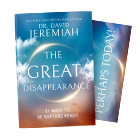I’ve never looked so out of shape—fat, bloated, heavy in the middle, legs like tree stumps, arms like sewer pipes. The next minute, I faced an opposite set of problems: I looked like a ten-foot pole with big feet. My kids laughed, and we all had fun in the hall of mirrors at the county fair. The thin, flexible mirrors, called distortion mirrors, were curved, twisted, and bent so as to warp the images and reflect a distorted sense of reality.
If you want to see real distortion, aim the mirror of our popular culture at the Christmas story in the Gospels. The “holidays” no longer reflect the true meaning of Christmas. John MacArthur, in his The Incarnation of the Triune God, wrote, “Christmas has really become a hopeless muddle of confusion. The humility and the poverty of the stable are somehow confused with the wealth and indulgence and selfishness of gift giving. The quietness of Bethlehem is mingled with the din of shopping malls and freeway traffic. The soberness of the Incarnation is somehow mixed with the drunkenness of this season.”[1]
The paradox of Christmas is heard in the sounds—the honking of car horns, the jingling of bells, the laughing of children, the strains of the carolers, the “Ho, Ho, Ho” of department store Santas. It’s all a part of the frenzy of the season; yet the best Christmas moments are the quiet ones, and the best reflection of Christmas takes place in the mirror of our own hearts.
One verse in the Bible tells us exactly how to celebrate Christmas, and who better than Mary herself to set the example. Luke 2:19 says, “But Mary kept all these things and pondered them in her heart.”
Pondering is a word worth pondering. According to the dictionary, it means “to weigh in the mind, to think about, to reflect on. . . .” This describes a biblical pattern, for the psalmist wrote: “Reflect in your heart and be still. . . . I will reflect on all You have done and meditate on Your actions . . . I reflect on the work of Your hands” (Psalm 4:4; 77:12; 143:5, HCSB).
“Sober reflection is good for the heart,” says Ecclesiastes 7:3 (NET).
There are lots of ways to practice the art of personal reflection during the holidays. The final moments of the day are often the best when the kids are in bed and we walk through the house a final time to turn off the lights and lock the doors. In the darkness with only the twinkling glow of the Christmas tree lights, it’s fun to sink into a chair, hand curled around a cup of cocoa, and ponder the ageless wonders of Christmas.
It’s also wonderful to gather the family around the tree for a traditional reading of the Christmas story, perhaps on Christmas Eve. I grew up hearing the Christmas story told in the classic language of the King James Version, and to me it’s still beautiful: “And it came to pass in those days, that there went out a decree from Caesar Augustus, that all the world should be taxed . . .” (Luke 2:1). Reading those words to my grandchildren can still bring a tear to my eyes.
How wonderful to arrive early for Christmas Eve services and sit quietly in the pew listening to the strains of the organ, or relax at our desk as a candle flickers in the darkness, or to get up early on Christmas Day to watch the sun rise briskly in the east. How wonderful to reflect on the timeless story of Jesus, keeping it in mind and pondering these things in your heart.
It’s one of the best ways of Christmas.





